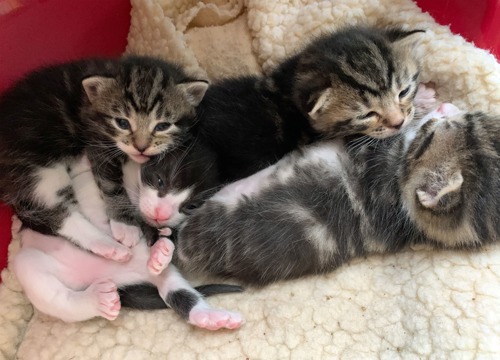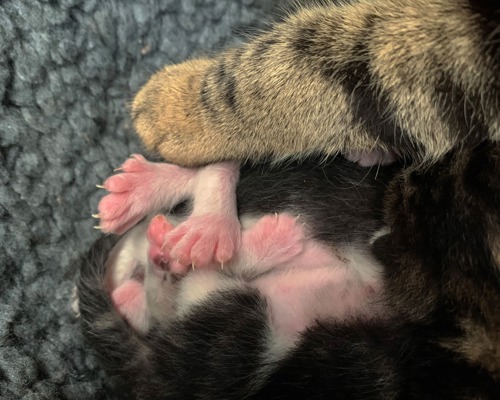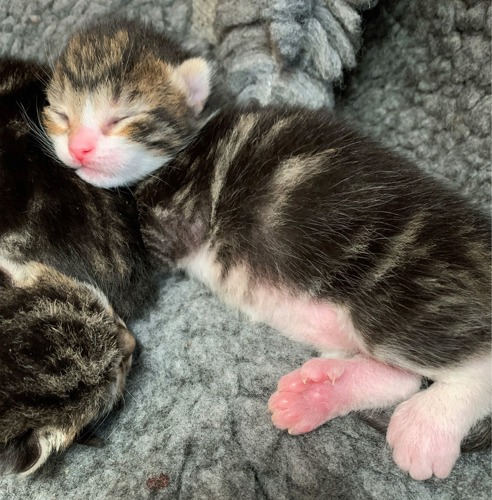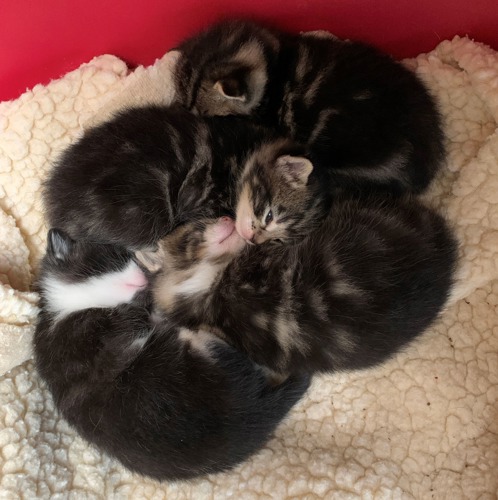You wait years for a many-fingered kitten to be born and then three come along at once! A trio of polydactyl kittens with extra digits have been born in the care of Cats Protection’s Gosport Town Branch.

The kittens’ mother, Martha, was a stray cat was found living in the grounds of a Gosport retirement complex and is barely more than a kitten herself at around one year old.
The tabby was well known at Victory Court in Bridgemary where residents had delighted in feeding her while advertising locally to find out whether she had an owner.
When nobody came forward to claim her, a kind member of the public got in touch with our Gosport Town Branch, concerned that Martha might be pregnant.

The concerns were justified and once safely in the care of the volunteer-run branch, she gave birth to four kittens just over a week later, on 3 May, within a three-hour period.
Now just over three weeks old, three of the four tiny cats are polydactyl or ‘many fingered’. Cats typically have 18 digits, including their dew claws, but the four kittens and their mother, Martha, have 102 digits between them rather than the traditional 90.
Martha and tabby kitten Miller both have the usual four digits and one dew claw on their front paws as well as four digits on each back paw. Whereas black-and-white Ernest has five toes on each paw including elongated dew claw ‘thumbs’; his brother Hemingway who is tabby-and-white with a pink nose has six toes on each paw while their tabby-and-white black-nosed sister, Havana, has five toes on each back paw and six toes on each front paw.

The kittens’ names were chosen because writer Ernest Hemingway is said to have been given a six-toed cat named Snow White by a sailor who docked in Key West. Today over 60 polydactyl cats, many of which are likely to descend from Snow White, live at a house and museum on the Florida island which was once the writer’s home.
Although not common, polydactyl cats can also be found across the UK. It is a genetic condition that, in the majority of cases, causes no harm to the cat. Some polydactyl cats can have up to three extra digits on each foot.
The unusual kittens will be Martha’s last litter as she will be neutered once the kittens are weaned. This will not only prevent her from becoming pregnant again but also decrease the likelihood of her getting hormone-related cancers as well as minimising the threat of other diseases and risks associated with unneutered cats.
 The kittens will be ready to find new homes when they’re nine weeks old
The kittens will be ready to find new homes when they’re nine weeks old
Branch Coordinator Kate Stapleford said: “Kittens are always a delight, but to have three polydactyl kittens is extremely unusual. I’ve been fortunate in fostering several cats over the years who have been polydactyl and remember back in 2012 the branch had two littermates who were polydactyl but I’ve certainly not cared for three polydactyl kittens at once before.
“Although the kittens are gorgeous and are taking advantage of their extra digits by learning to walk and climb over each other as soon as they can, Martha was a young mum and pregnancy, especially in stray cats, can have many risks.
“All cats that leave Cats Protection’s care are neutered, or if they are too young, as in the case of Martha’s kittens, we will liaise with the new owners to arrange a convenient time for neutering and second vaccinations which we will arrange and pay for on their behalf.
“We also encourage existing cat owners to have their own cats neutered as early as possible and are able to assist anyone who is struggling to afford the operation for their cat with vouchers to cover the cost, which can be redeemed at local vets.”
A survey* by Cats Protection found that 77% of respondents were unaware cats could get pregnant from as young as four months old, while 86% did not know a female cat could produce up to 18 kittens in just one year.
To find out more about Cats Protection’s means-tested neutering scheme visit https://www.cats.org.uk/what-we-do/neutering or call the neutering helpline 03000 12 12 12 between 9.30am and 1pm on weekdays.
Martha and her kittens will be ready to go to new loving homes once the kittens are at least nine weeks old. To adopt them, keep an eye on the branch’s at https://www.cats.org.uk/gosport
